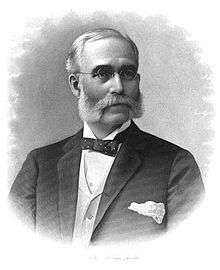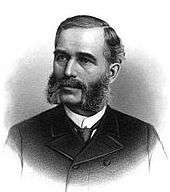Dexter M. Ferry
Dexter Mason Ferry (August 8, 1833 - November 10, 1907)[1] was a businessman from Detroit, Michigan who founded D.M. Ferry & Co., at one time the largest seed company in the world.[1]
Dexter M. Ferry | |
|---|---|
 | |
| Born | Dexter Mason Ferry August 3, 1833 Lowville, New York |
| Died | November 10, 1907 (aged 74) |
| Occupation | businessman |
| Spouse(s) | Addie E. Miller |
| Children | Dexter M. Ferry, Jr. Blanche Ferry Hooker Queene Ferry Coonley |
| Signature | |
Early life
Dexter M. Ferry was born in Lowville, New York on August 8, 1833, the son of wagonmaker Joseph N. and Lucy Mason Ferry.[1] When Dexter was three, his father died, and his mother moved to Penfield, New York, where Dexter spent his school years. When he was 16, Dexter Ferry began working on a farm, earning $10 per month, and attending school in the winter.[2] In 1851, he began working for Ezra M. Parsons of Rochester, New York, and entered school there. A few months later, Parsons secured a position as an errand boy for Ferry at the S.D. Elwood & Company of Detroit, a stationery firm, and in 1852 Ferry moved to Detroit. He was soon promoted to salesman at the firm, and later bookkeeper.[1]
D.M. Ferry & Co.
In 1856, Ferry got into the seed-growing business as a junior partner, along with Milo T. Gardner and Eber F. Church,[3] of M.T. Gardner & Company (also known as Gardner, Ferry, and Church). The first year, the company did $6000 in business[4] and it continued to be stable, but unremarkable, until 1865, when Ferry bought out Gardner's share and took over the company.[5] Ferry changed the company name to Ferry, Church & Co, and two years later, when Church retired,[6] changed the name again, this time to D.M. Ferry & Co.[1]
Ferry introduced several innovations in the seed-vending business. He sold only fresh seed, increasing germination rates and establishing a reputation for quality.[7] Ferry was among the first to sell seeds in small packets.
The business grew steadily, and in 1879 was incorporated under the name D.M. Ferry & Co with $750,000 in capital, with Ferry as president,[5] James McMillan as vice-president, H. Kirke White as secretary, and Charles C. Bowen as treasurer.[4] A. E. F. White, John Stoughton Newberry, and W. K. Anderson were also officers.[4] At the same time, the Detroit Seed Company was absorbed into the new corporation. Business of the company continually increased for some time, until January 1, 1886, when a disastrous fire demolished the company's warehouse with the loss of near $1,000,000.[5] However, Ferry quickly organized the company, bought seeds from outside sources and absorbed two smaller seed companies, and the company managed to fill orders for its customers.[5]
Ferry built a new warehouse, and by 1890 was doing over a million and a half dollars in business annually.[5] By the early 1900s, the company was doing over $2,000,000 per year in business, and supplying seeds to 160,000 retail outlets.[4]
Personal life

On October 1, 1867, Ferry married Addie E. Miller. The couple had three children who outlived them: Dexter M. Ferry, Jr., Blanche Ferry Hooker, and Queene Ferry Coonley.[1]
Other pursuits
Dexter M. Ferry was also president of the First National Bank of Detroit, the Union Trust Company, Standard Accident Insurance Company, Michigan Fire & Marine Insurance Company, the American Harrow Company, and the National Pin Company,[1] and one of the organizers of the Wayne County Savings Bank.[2] He also owned substantial real estate, much of it used by his seed company. He helped manage Detroit's Harper Hospital for nearly forty years,[2] and was one of the founders of Grace Hospital.[1]
He was a trustee of Olivet College and of the First Congregational Church of Detroit,[1] and of the predecessor to the Detroit Institute of Arts, the Detroit Museum of Art[5]
Ferry was also active in public service and Republican politics. He served one term on the Detroit Board of Estimates in 1877-78, and on the Detroit Board of Park Commissioners in 1884. In 1892 and 1904 he was a delegate from Michigan to the Republican National Convention. He was Chair of the Republican State Central Committee in 1896-98, and a candidate for nomination for governor in 1900.[1]
Death
Addie Ferry died on November 2, 1906.[1] Dexter M. Ferry closely followed his wife, dying on November 10, 1907.[1] He was buried at Woodmere Cemetery in Detroit, Michigan.
References
- Clarence Monroe Burton; William Stocking; Gordon K. Miller, eds. (1922), The city of Detroit, Michigan, 1701-1922, Volume 3, The S. J. Clarke publishing company, pp. 8–12
- Charles Moore; Lewis Publishing Company (1915), History of Michigan, Volume 2, Lewis Publishing Company, pp. 1113–1116
- "Where it began". Ferry Morse Seed Company. Archived from the original on July 10, 2011. Retrieved June 27, 2011.
- Compendium of History and Biography of the City of Detroit and Wayne County, Michigan, Henry Taylor & Co, 1908, pp. 174–176
- Western Publishing and Engraving Co (1890), John Bersey (ed.), Cyclopedia of Michigan: historical and biographical, Western publishing and engraving co., pp. 134–136
- Mike Dunton. "Dexter Mason Ferry". Seedsmen Hall of Fame. Victory Seed Company. Retrieved April 22, 2012.
- Judith M. Taylor (2011). "Ferry Morse Seed Company, San Francisco". Horthistoria. Retrieved June 28, 2011.
| Party political offices | ||
|---|---|---|
| Preceded by James McMillan |
Chairman of the Michigan Republican Party 1896 – 1898 |
Succeeded by Arthur M. Marsh |